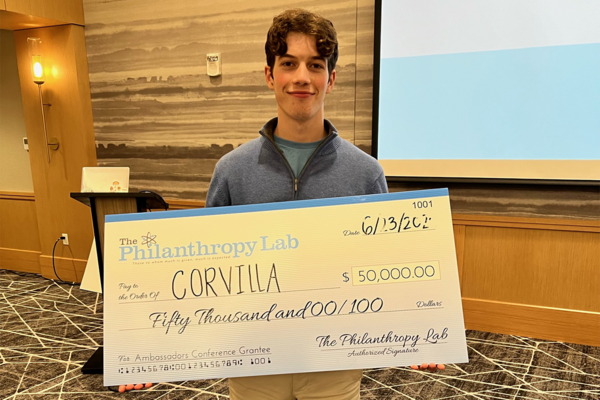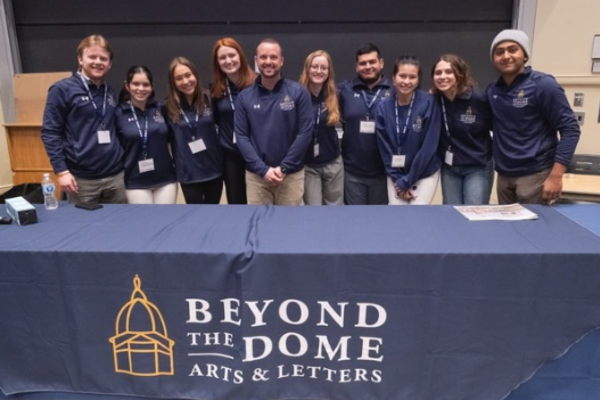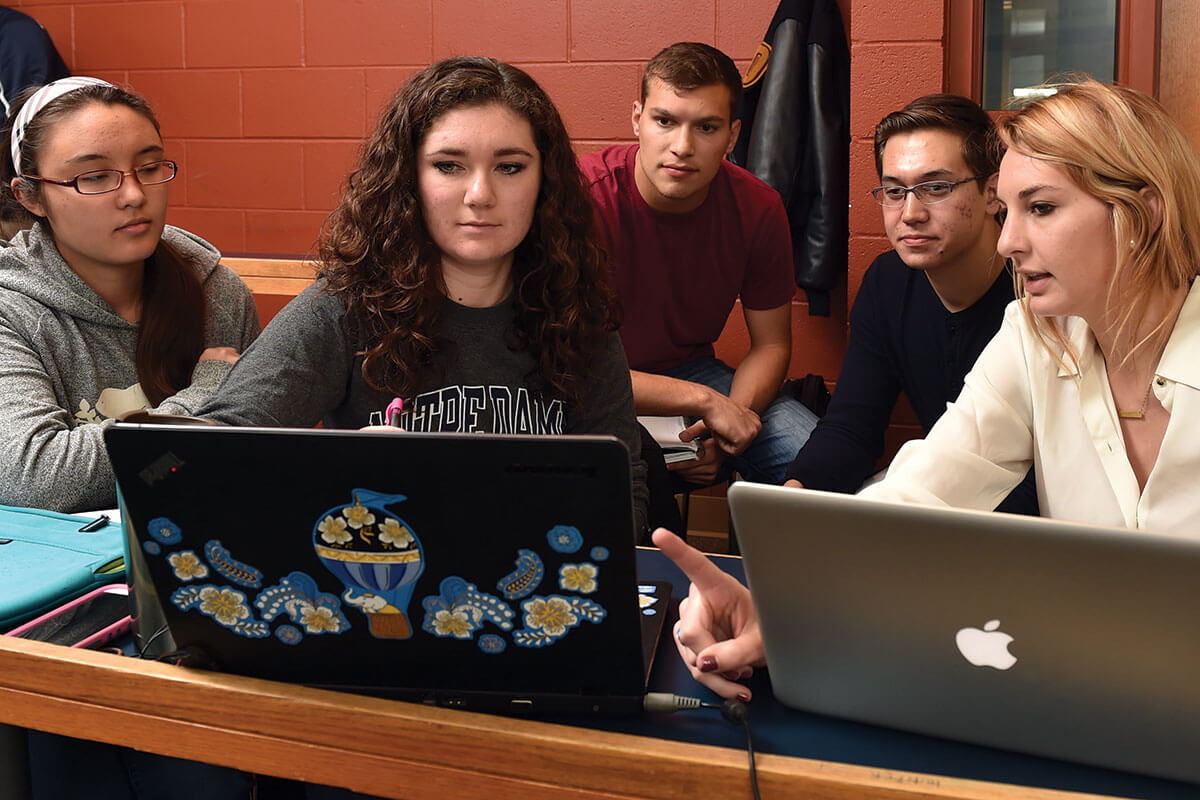 Designed to help students obtain skills needed for success in the modern digital world, the CDT minor can be extremely appealing for prospective employers who are already attracted to the communication, organization, and analytical skills honed through the liberal arts.
Designed to help students obtain skills needed for success in the modern digital world, the CDT minor can be extremely appealing for prospective employers who are already attracted to the communication, organization, and analytical skills honed through the liberal arts.
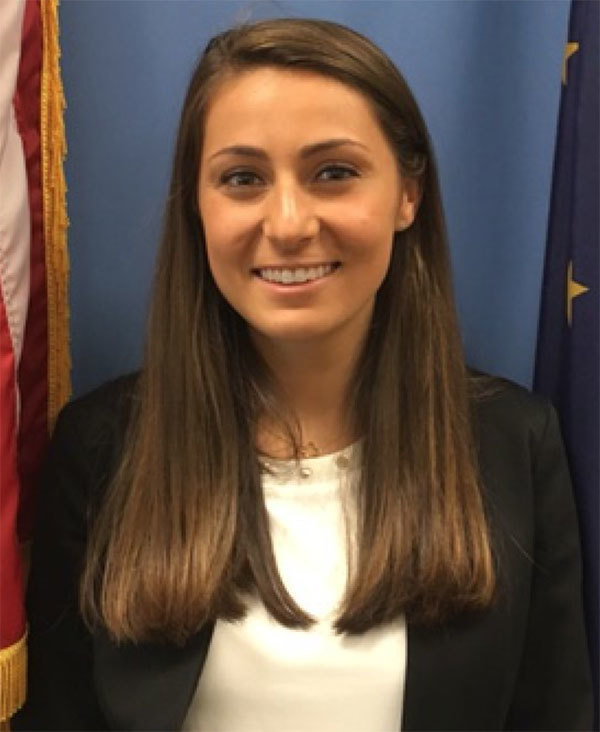 Christina Casino
Christina Casino
Four days a week, junior Christina Casino is taking economics classes, working as a mentor and tutor, and studying French.
On Fridays, she’s helping FBI agents and police officers execute search warrants.
“It’s very cool, because a normal student wouldn’t be able to do this,” said Casino, an economics major with a concentration in financial economics and econometrics. “I would never have thought this would be part of what I would do in college.”
That experience is part of Casino’s internship through the Idzik Computing and Digital Technologies Program (CDT), a College of Arts and Letters interdisciplinary minor now in its third year. A partnership between CDT, the St. Joseph County Prosecutor’s Office, and the St. Joseph County Police Department, the internship program helps students in the minor’s cyber safety and security track gain practical experience in law enforcement matters.
Casino spent last summer as a paid intern, then continued on through the academic year, helping the St. Joseph County cyber crimes unit identify, investigate, and prosecute cyber criminals. The experience helped her land an internship at Deloitte focused on cyber risk.
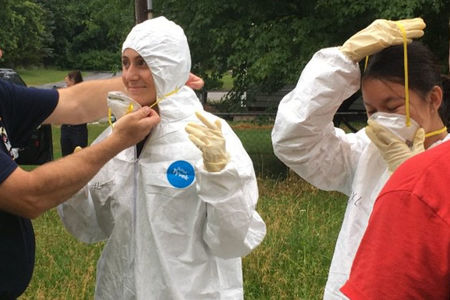 Christina Casino (left) puts on a hazmat suit as she prepares to assist in executing a search warrant in St. Joseph County.
Christina Casino (left) puts on a hazmat suit as she prepares to assist in executing a search warrant in St. Joseph County.
The experience is one of many ways the CDT program is helping Arts and Letters majors supplement their education with technological and programming skills.
“The business world is coming to the conclusion that liberal arts students are trained in ways that are very beneficial to companies,” said Charles Crowell, director of the CDT program. “You add better-than-average technology skills, which even a minor can give you with only five courses, and now you have a combination of things that employers are finding very attractive.”
The program was endowed and renamed this year in honor of its generous benefactors, Paul and Ruth Idzik. Paul, a 1983 graduate of Notre Dame who majored in economics and computer applications, is the former CEO of E-Trade after an extensive career in the finance and consulting industries. Ruth, who is receiving her MBA from Notre Dame this spring, also had a robust career in finance and has worked in more 40 different countries.
“We strongly believe the world-class liberal arts degree Notre Dame provides should also feature the opportunity for exposure to the world of advanced technology,” Paul Idzik said. “Ruth and I are extremely pleased and fortunate to be able to support this program, which offers incredible training and experiences that will prepare students for success in a variety of fields.”
“We strongly believe the world-class liberal arts degree Notre Dame provides should also feature the opportunity for exposure to the world of advanced technology. Ruth and I are extremely pleased and fortunate to be able to support this program, which offers incredible training and experiences that will prepare students for success in a variety of fields.”
— Paul Idzik '83, former CEO, E-Trade
Designed to help students obtain skills needed for success in the modern digital world, the CDT minor can be extremely appealing for prospective employers who are already attracted to the communication, organization, and analytical skills honed through the liberal arts.
Samuel Roden ’16, a political science and psychology major who minored in CDT, now works as a security analyst in UnitedHealth Group’s security operations center in Minnesota. CDT gave him both practical training in the field he was interested in — cybersecurity — while also equipping him with core programming skills that were essential to him landing a job in IT.
“Being able to have an intelligent conversation with those in the industry, especially interviewers, is critical,” he said. “So much of learning in the IT field is done on the job, as you learn your company's various systems and processes, so simply having the fundamentals of programming, networking, security, and more down gives you all you need to succeed in interviews for beginning roles.”
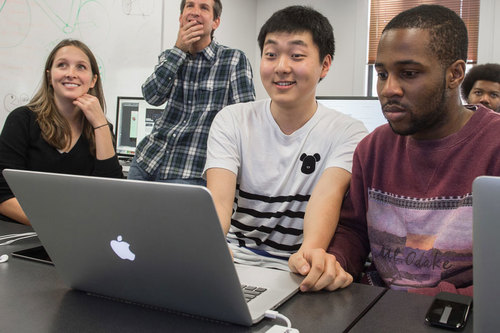 CDT students take a two-semester core sequence of programming courses, then three electives in Arts and Letters and Engineering.
CDT students take a two-semester core sequence of programming courses, then three electives in Arts and Letters and Engineering.
Developed with input from Arts and Letters alumni who are now tech industry leaders, the program features six tracks — user interface and experience, cyber safety and security, cognitive science, digital humanities, digital arts, and technology development and management. Students take a two-semester core sequence of programming courses in the College of Engineering, then three electives from an array of options in Arts and Letters and Engineering.
“If you look at the tracks, they are related to the skills that employers are looking for and the strengths that we have as a College,” Crowell said.
The program includes faculty from the College of Engineering, the Kaneb Center for Teaching and Learning, the Office of Information Technologies, and programs throughout Arts and Letters — including art, art history, and design; English; film, television, and theatre; philosophy; and psychology. Matthew Wilkens, an associate professor of English whose research involves digital humanities, is also now the Ruth and Paul Idzik Associate Professor in Digital Scholarship within CDT.
In a one-credit seminar, Technology as a Profession, CDT students have the opportunity to hear from practicing technology professionals about their journey, preparation, and the benefits of a liberal arts education.
“It's important for students to have an opportunity to spend some time with people who are living these professions out,” Crowell said. “That's the role of the seminar, to bring people back who have technology careers, experience, or related careers that are relevant and give students an opportunity to listen to them and get their advice on technology and their careers.”
Beginning in 2019, CDT minors will also have the opportunity to spend a semester in Silicon Valley getting hands-on experience. As part of an initiative through Notre Dame California, students will be able to take classes and complete a tech-related internship.
Ultimately, Crowell believes, the CDT minor sets students up to succeed in a wide variety of disciplines, making them more attractive candidates for jobs in nearly any field. While the program is only a few years old, its already proven to be quite successful.
"From the beginning, we had this idea that you can use technology, no matter what your first major was, as a springboard for immediate employment into the business world. There's just a lot of opportunity to be hired by companies that work in all sorts of different aspects of technology,” he said. “And if you understood a little bit about business as well, then you are going to fit right in.”
“From the beginning, we had this idea that you can use technology, no matter what your first major was, as a springboard for immediate employment into the business world. There's just a lot of opportunity to be hired by companies that work in all sorts of different aspects of technology.”
— Charles Crowell, director of CDT

